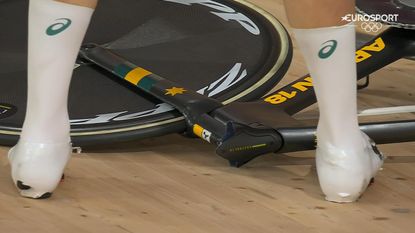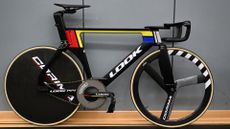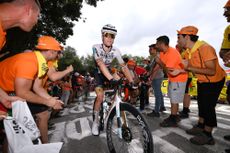Australian federation shares update on investigation into handlebar failure that caused Tokyo Olympic crash
The Aussie team pursuit squad missed out on the gold medal final after the integrated bars and stem snapped during competition


The latest race content, interviews, features, reviews and expert buying guides, direct to your inbox!
Thank you for signing up to The Pick. You will receive a verification email shortly.
There was a problem. Please refresh the page and try again.
The Australian cycling federation has provided an update on its investigation into the disastrous handlebar failure at theTokyo 2020 Olympics., which caused a crash during the men's team pursuit.
Hopes of a gold or silver medal in the men’s team pursuit were dashed for Australia, when track rider Alexander Porter went down hard after his time trial bars snapped during their qualification ride.
Under the Olympic rules, the Australian TP squad were allowed to re-run their qualifying ride but missed out on the gold medal final, instead settling for the bronze.
AusCycling, the Australian national governing body for cycling, has now appointed two independent experts who will conduct an investigation into the incident.
The investigation hopes to highlight some specific recommendations to prevent similar equipment failures happening in future.
项目领导将托尼Cumpston,前high performance director of Hockey Australia, while mechanical and aeronautical engineer John Baker will be an expert witness in the proceedings, utilising his experience of investigating aircraft crashes.
AusCycling CEO Marne Fechner said: ‘’At the time we committed to a thorough, independent, and transparent review of what happened, and we’re now well placed to deliver on that promise.”
"Toni and John are leaders in their respective fields and have the blessing of the AusCycling Board and leadership to find out exactly what happened and what to do to prevent it happening again.”
The crash happened on August 2, during the track events at the Tokyo 2020 Olympics, as Porter went down during the qualifying for the men’s team pursuit.
As the four riders hit the banking, Porter slid out at the back of the quartet, a touch of wheels initially suspected to have caused the fall but television replays showing he hadn't been touched, his hands fell and he followed as the handlebars gave way.
Australia immediately signalled they were stopping, able to have another go under the 'recognised mishap' rule, as Porter started to pick himself up from the track.
The recognised mishap rule entitles a team or rider to one restart if they suffer a legitimate fall, a puncture or the breakage of an essential part of the bicycle.
After 20 minutes, Australia were back on the track for another go, including Porter, but could only manage fifth place after their ordeal with a time of 3-48.4, meaning they were out of the fight for gold and silver.
The Australian team then went up against New Zealand in the bronze medal final two days later, and were able to put the ordeal behind them to secure the final medal spot.
Australian brand Bastion later confirmed tobeplay手机客户端下载that it produced thehandlebar which failedduring the Olympic men's team pursuit qualifiers.
Bastion published a statement in the days after the crash, saying: "Our team is working with the Australian Olympic Team to understand the cause behind the failure of one of our handlebar units during the four-person, Australian pursuit challenge at the Tokyo Olympics overnight.”
The company uses a form of 3D printing to manufacture its products in-house, with aerodynamics playing a defining role in the team pursuit event, and margins growing ever slimmer, teams are moving to 3D printed and custom parts in order to gain the advantage available from sizing components to the exacting needs of athletes - without the need for a custom carbon mould.

Thank you for reading 10 articles this month* Join now for unlimited access
Enjoy your first month for just £1 / $1 / €1
*Read 5 free articles per month without a subscription

Join now for unlimited access
Try first month for just£1 / 1 /€1美元
Get The Leadout Newsletter
The latest race content, interviews, features, reviews and expert buying guides, direct to your inbox!
Alex Ballinger is editor ofBikeBizmagazine, the leading publication for the UK cycle industry, and is the former digital news editor for CyclingWeekly.com. After gaining experience in local newsrooms, national newspapers and in digital journalism, Alex found his calling in cycling, first as a reporter, then as news editor responsible for Cycling Weekly's online news output, and now as the editor of BikeBiz. Since pro cycling first captured his heart during the 2010 Tour de France (specifically the Contador-Schleck battle) Alex covered three Tours de France, multiple editions of the Tour of Britain, and the World Championships, while both writing and video presenting for Cycling Weekly. He also specialises in fitness writing, often throwing himself into the deep end to help readers improve their own power numbers. Away from the desk, Alex can be found racing time trials, riding BMX and mountain bikes, or exploring off-road on his gravel bike. He’s also an avid gamer, and can usually be found buried in an eclectic selection of books.
-
-
 Up close with the unreleased Look P24 - the track bike with two seatposts
Up close with the unreleased Look P24 - the track bike with two seatpostsDeveloped in conjunction with the French Track Cycling Team, the unreleased bike shares features with Team GB's Lotus x Hope bike
By Joe BakerPublished
-
 ‘We’ll let them come to us on Sunday’ - Fred Wright says British team will relish underdog status in elite men’s road race
‘We’ll let them come to us on Sunday’ - Fred Wright says British team will relish underdog status in elite men’s road raceLuke Rowe: 'If you wait and try to race them man on man in the final, I think you’re just waiting with a loaded gun to your head'
By Tom ThewlisPublished

